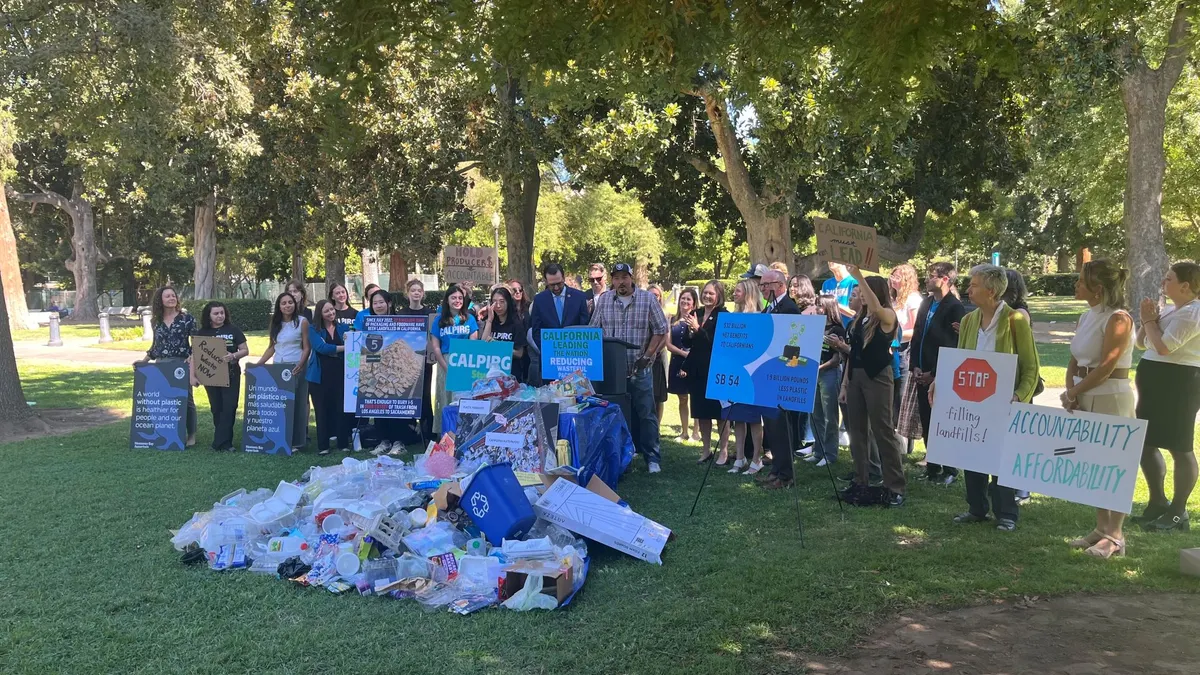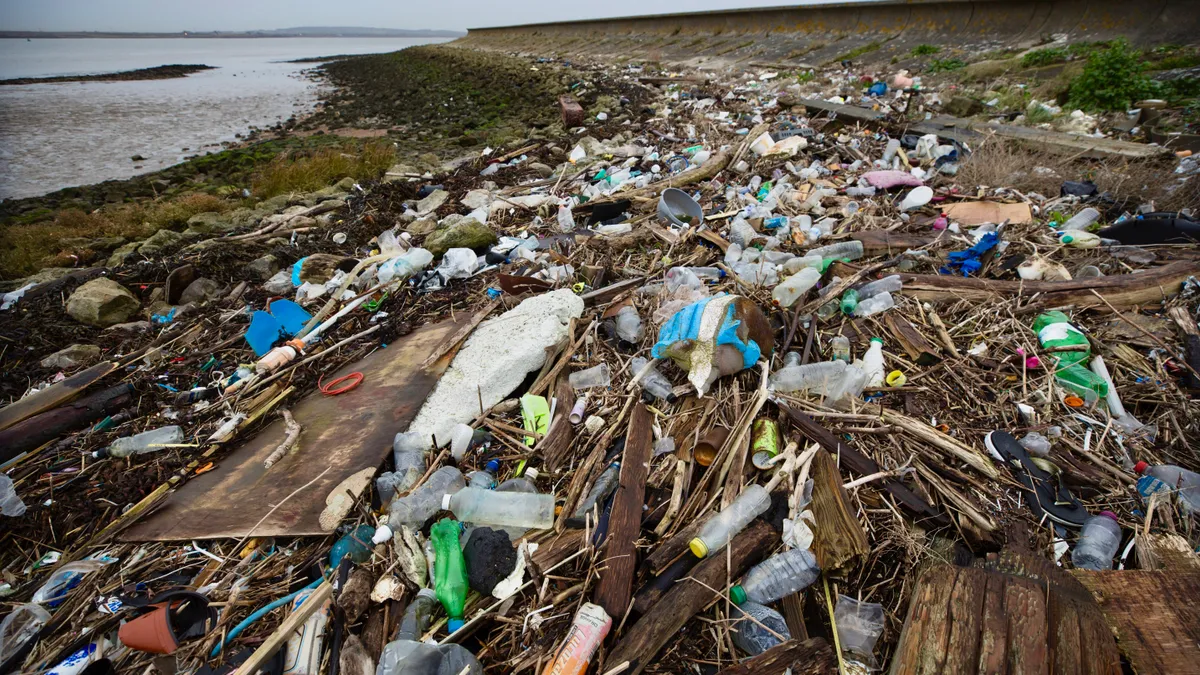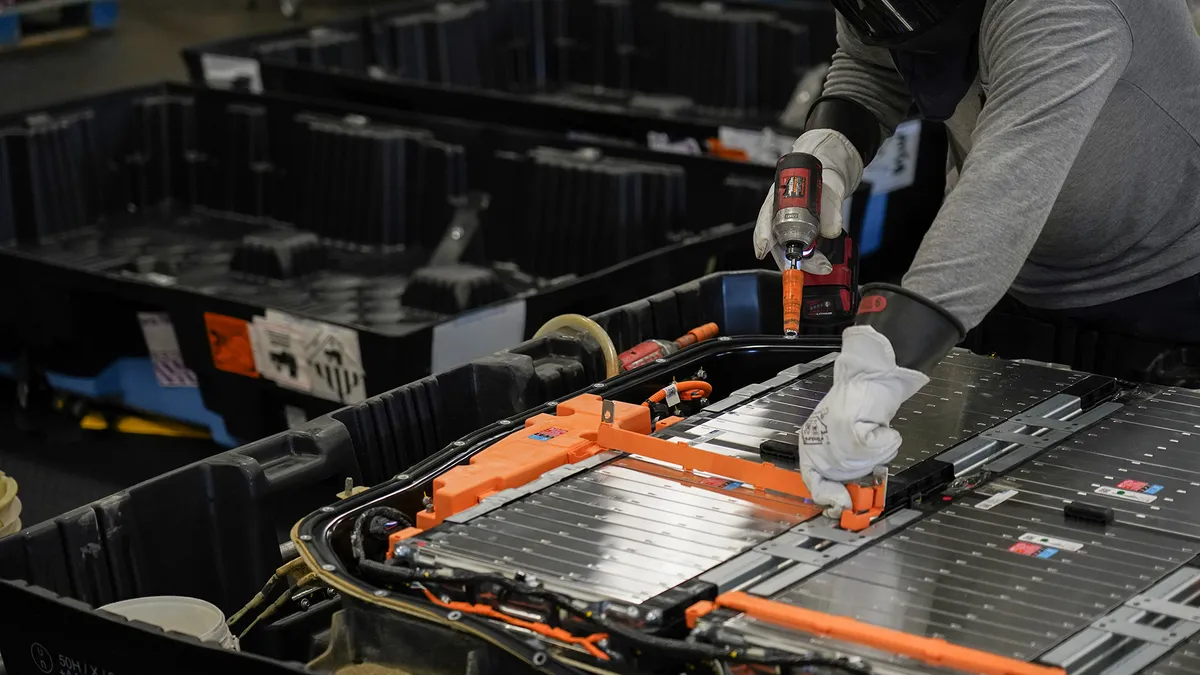Less than a week after China shook up the global recycling industry with its announcement of a scrap import ban, details are thin and the possibilities are vast.
According to a July 18 filing with the World Trade Organization (WTO), the country will stop accepting four classes and 24 categories of "solid waste" by the end of the year. That includes multiple types of plastics, textiles, mixed fibers and other materials. The exact specifications of what will be rejected are still being investigated, but it’s clear that China will be accepting less material. Minimal rationale was provided in the Ministry of Environmental Protection's WTO filing aside from concerns about pollution from “foreign garbage” imports.
"To protect China's environmental interests and people's health, we urgently adjust the imported solid wastes list, and forbid the import of solid wastes that are highly polluted," read the filing.
This isn’t the first time China has gotten strict on scrap specifications in recent years. The 2013 Operation Green Fence limited imports and the more recent National Sword (or Sharp Sword) smuggling crackdown has slowed operations as well. Yet if this latest policy is what it seems, many believe the implications could be deeper and more permanent.
Based on initial reactions and conversations, here are some of the top questions on the minds of industry professionals so far.
Why did China file a ban and could it be willing to compromise?
Shortly after China’s announcement, the Institute of Scrap Recycling Industries (ISRI) released a statement calling this policy potentially “devastating” and “catastrophic” for the U.S. recycling industry. ISRI estimates that the U.S. exported $5.6 billion in scrap commodities to China last year and has conducted analysis showing the domestic scrap industry supports hundreds of thousands of jobs.
Adina Adler, ISRI’s senior director of international relations, told Waste Dive that less than 5% of Chinese scrap imports could be considered contaminated under these new standards, so her organization is trying to get a better understanding of what exactly the country hopes to target.
"It's a crowd-pleasing stand. But far from solving China's environmental problems, this crackdown will actually worsen them — and do so at the expense of jobs and economic growth around the world."

Adam Minter
Reporter & author
“You’re still going to be up against interpretations by port authorities on what they would consider as clean versus dirty," said Adler.
On a global level, the Bureau of International Recycling (BIR) has been equally perturbed by the news. Statements from the organization have similarly called this policy “serious” and “devastating." BIR has also taken issue with the 48-hour comment window and asked the WTO to enforce a more standard 60-day period.
Another key question is whether this new policy will achieve what China hopes. Adam Minter, author of "Junkyard Planet" and a longtime reporter on the global scrap trade, wrote an editorial for Bloomberg View making the case that it will not.
"It's a crowd-pleasing stand. But far from solving China's environmental problems, this crackdown will actually worsen them — and do so at the expense of jobs and economic growth around the world," wrote Minter.
Minter recognizes that contaminated imports are an issue, one which he has witnessed firsthand, but said that is far outweighed by the overall benefit of a cleaner recycling stream coming from the U.S.
How much responsibility does the U.S. industry bear and what will it do next?
Some may argue this ban should not come as a complete surprise following China’s other recent trade policies and the fact that imports for categories such as plastic have been declining since 2013. That trend, coupled with a rise in single-stream processing, has brought issues with contamination to the forefront. Consumer behavior plays a key role in this, but some industry observers say cities can do more to keep high residue rates in check through contract specifications.
"The cities don’t know that they’re in charge," said Gary Liss, vice president of Zero Waste USA, "and the waste haulers aren’t telling them they’re in charge."
Liss sees reduced quality as a side effect of the single-stream wave and doesn’t believe enough is being done outside of markets with regulatory drivers such as California.
"We all need to be doing our roles and what the cities don’t understand is their role is to hold the line on residue. If they don’t hold the line then the economic forces on the marketplace are pushing toward more residue and what China’s doing is squeezing down on that,” he said.
In Liss' view, the recent trend of service providers shifting more of the commodity risk toward municipalities may be counterproductive to getting the highest quality feedstock. Yet working to enforce cleaner streams also comes with a cost — depending as always on regional factors. “Zero waste” cities may choose to take that on for environmental reasons and charge customers accordingly. Though other cities may not be willing or able to factor in anything aside from pure economics.
Because not every city or service provider is going to start spending more on recycling, others worry this new China policy could set the U.S. industry back.
Steve Alexander, executive director of the Association of Plastic Recyclers (APR), said he remains optimistic about a better future that is less reliant on the volatile Chinese market but pointed to No. 3-7 plastics as vulnerable in the short-term.
"The real concern is this is going to impact the segment of the industry that we’ve worked very hard to grow the last five years," said Alexander. "What we’re worried about obviously is consumer access to recycling for these resins."
Since not all recycling programs are created equal, it’s possible that people in some areas could see their list of accepted material types decrease. If this happens to the point that certain categories or products slip below the key Federal Trade Commission threshold of 60% diversion access, then they might lose their recyclable status. This could put yogurt cups and other less established products back into the realm of store drop-off bins or just disposal.
Could this be what it takes to spur a new wave of domestic processing investment?
Some believe this could make the idea of keeping more material in the U.S. rather than shipping it overseas a politically attractive prospect. A bill introduced in Congress to invest $100 million in recycling facilities is one common example of what's possible. The case has also been made that this would align with President Trump’s infrastructure and job creation priorities.
"To make it in America let’s get the recyclables right, let’s get the specifications by cities right and let’s put some tax credits in place to re-open the mills that closed," said Liss.
Adler said ISRI does not take any positions on where scrap ends up going, and is open to more domestic processing, though cautioned that even in the best-case scenario it would take multiple years to establish enough new capacity to offset what China has been taking.
"To make it in America let’s get the recyclables right, let’s get the specifications by cities right and let’s put some tax credits in place to re-open the mills that closed."

Gary Liss
Vice President, Zero Waste USA
That doesn’t mean investments aren’t already being made in U.S. recycling infrastructure. The Closed Loop Fund, which launched in 2014 with the mission of investing $100 million in recycling projects, has been one of the most prominent drivers. So far, the Fund has invested about a quarter of that money in 10 projects around the country and attracted large amounts of additional capital in the process. Based on their projects so far, and stated interest for future investments, the Fund is set to play a key role in both the quality and end-market issues highlighted by China’s new policy.
"A lot of the infrastructure in material recovery facilities frankly was built 10 years ago or more. So there’s a lot of outdated equipment that needs to be updated to create the most efficient, highest producing results,” Bridget Croke, Closed Loop Fund's head of external affairs, told Waste Dive.
Croke said the options for improving quality range from robotic sorting to more resident education, with careful contract specifications also an important factor. Decreasing dependence on export markets such as China will mean investing in the technology needed to improve challenging material streams such as glass and various plastics. While many of the hundreds of proposals received by Closed Loop Fund are still too underdeveloped, the ones that do make the cut can attract $3 of outside capital for every $1 of investment. This success has helped attract more traditional investors and the new policy shift from China could accelerate that process.
"Sometimes there are complications in the market that can activate change and there’s pros and cons to anything that happens,” said Croke. "I would definitely say that recycling has a huge opportunity to drive regional manufacturing jobs."
Where does the industry go from here?
Early reports indicate that China's announcement has already begun to affect activity among brokers, potentially leading to a shift in commodity prices, and U.S. recyclables could end up going to other markets in greater volumes as a result. According to ISRI, current growth markets for paper include Mexico, Vietnam, Canada and the Netherlands; with recent export upticks to India and Thailand, too. Destinations vary by type on the plastics side, with Malaysia and Vietnam emerging as common growth markets across multiple categories.
ISRI is not giving up on engaging with China either and has been working to learn more through all possible channels. A surprise presidential tweet could also change the whole conversation, but so far industry observers said the issue is less pressing than other trade matters.
"Although municipal officials and the waste industry consider China’s recent import ban filing with the WTO a top priority, it is unclear whether the Trump administration, or even the Chinese, feel the same way," wrote David Biderman, CEO of the Solid Waste Association of North America, via email. “[Last] week’s bi-lateral trade discussions between Chinese and American officials in Washington (the U.S.-China Comprehensive Economic Dialogue) focused on steel, not recyclables. Further, the talks reportedly did not go particularly well, and it remains to be seen what impact, if any, they may have on the waste and recycling sector in both North America and Europe."
It remains unclear whether this will result in companies attempting to charge more, cities cutting back on their recycling access, a new infrastructure boom in the U.S. or entirely unexpected results. Long-time industry observers cautioned that it’s too soon to tell and emphasized the importance of keeping things in perspective.
"Every time there’s an activity like this, or spot prices go down for bales, or the price of oil goes down it’s like this hue and cry, 'Oh, the recycling market is dead.' This is an industry that’s been around, it’s been through these ups and downs," said Alexander. "The industry is going to survive. It’s just a question of what format does it survive in."


















